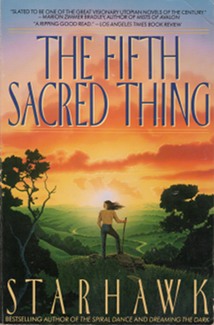Published in 1993 by Bantam Books

[standard disclaimer that this book review is solely my opinion, etc. Feel free to disagree with me!]
ABOUT THE BOOK
The novel takes place approximately 50 years in the future, after an enormous cataclysm has ended society as we know it. San Francisco (now known as “The City”) has been transformed into a pagan utopia, where racism, sexism, homophobia, and poverty have been eradicated, and their peaceful democracy works to heal the ravaged land under the guidance of the Four Sacred Things (Fire, Water, Air, and Earth). Meanwhile, to the South, the Millenialists, a theocratic society of fundamentalist Christians that exerts control by rationing water to its poor subjects are bent on seizing the City and subjecting it to military domination. The plot centers around 3 citizens of the City - the healer Madrone, the visionary crone Maya, and the musician Bird. As the Millenialists occupy the City, the defenders of the City face the dilemma of regaining their freedom without becoming the very enemy they seek to overthrow.
THE GOOD
I love the vision of the future that Starhawk weaves, with regards to the pagan utopia - she shows how a peaceful, egalitarian, democratic, feminist society that honors the Earth could work - and I really want to live there! (minus the biological weapons and attacks from the South, obviously). Not to mention the coolness of what a predominantly Neo-Pagan, polytheist society could look like. I also really like how the City functions - they’re sort of technologically backward, but they compensate with magic (for example, they have Witches called “tecchies” who operate the data network, but they have to commune with the crystals and ask the earth for permission to access the information). I also thought that the plot was really quite innovative. After all, don’t most books end with a rousing battle between good and evil? I really like how Starhawk reconciled the conflict between good and evil with the City’s pledge to nonviolence, which takes the plot in a direction that I don’t see often (if ever) in other stories. The characters were pretty cool (especially Bird). I also thought that the entire book was very inspirational, and I’ve even copied some of the quotes to my Book of Shadows.
THE BAD
My main complaint about the book is that Starhawk mostly writes non-fiction, and you can tell from her writing style. Her use of imagery and description of the scarred landscape of post-apocalyptic California is extraordinary, but I found her dialogue between characters (which comprises a lot of her book) to be kind of clunky. I also found that the first quarter of the book was a little bit slow (I almost put it down), but as soon as the plot got going, it was a real page-turner. I also found some of the descriptions of “ch’i” to be a little weird. But yeah, mostly little stuff.
TO TAKE WITH A GRAIN OF SALT
This book is NOT for those with weak stomachs. There is a lot of sexual content, violence, and gore (there’s plenty of mentions of gang rape, brutality, torture, human trafficking, etc.)
THE VERDICT
I LOVED this book! It was awesome; definitely a novel that any pagan should read. (taking off a quarter of a star for the writing style, but aside from that, it was GREAT). I'm definitely going to get my hands on Starhawk's other 2 novels.
4.75 out of 5 stars
BONUS
The Fifth Sacred Thing has been Kickstarted into a film! Don't know when it's going to come out, but you can find out more here and here.
(In case you're wondering, the Fifth Sacred Thing is Spirit. This is not really a spoiler.)
Starhawk's Declaration of the Four Sacred Things:
The Earth is a living, conscious being. In company with cultures of many different times and places, we name these things as sacred: air, fire, water, and earth.
Whether we see them as the breath, energy, blood, and body of the Mother, or as the blessed gifts of a Creator, or as symbols of interconnected systems that sustain life, we know that nothing can live without them.
To call these things sacred is to say that they have a value beyond their usefulness for human ends, that they themselves become the standard by which our acts, our economics, our laws, and our purposes must be judged. No one has the right to appropriate them or profit from them at the expense of others. Any government that fails to protect them forfeits its legitimacy.
All people, all living things, are part of the earth life, and so are sacred. No one of us stands higher or lower than any other. Only justice can assure balance; only ecological balance can sustain freedom. Only in freedom can that fifth sacred thing we call spirit flourish in its full diversity.
To honor the sacred is to create conditions in which nourishment, sustenance, habitat, knowledge, freedom, and beauty can thrive. To honor the sacred is to make love possible.
To this we dedicate our curiosity, our will, our courage, our silences, and our voices. To this we dedicate our lives.
